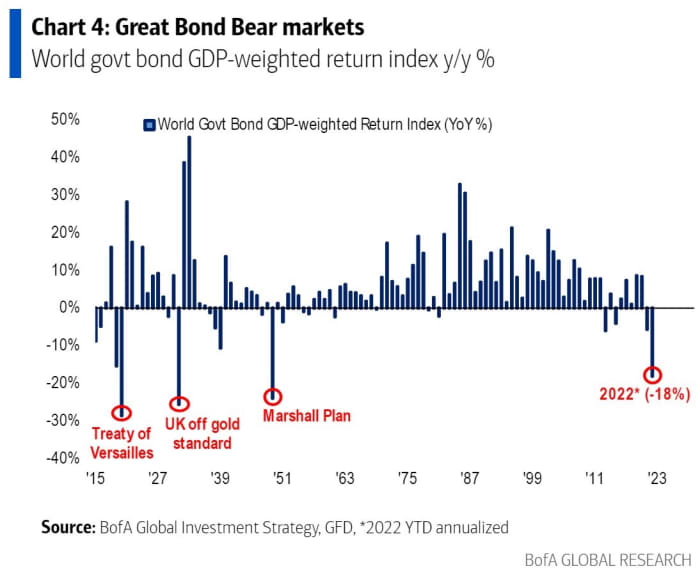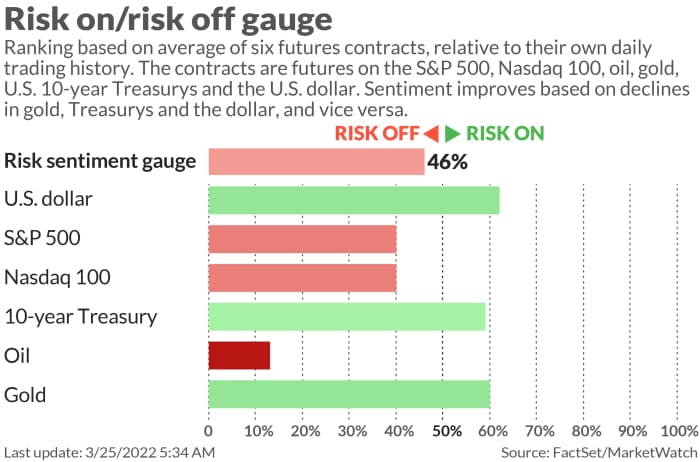This post was originally published on this site
What better time to invest in financials than at a time with rampant inflation and a Federal Reserve promising 11 rate hikes over the next two years?
Sam Peters, a portfolio manager at ClearBridge Investments, told MarketWatch that increasing loan demand, improving profitability as interest-rate spreads widen and a decline in valuations so far this year will boost the sector.
That’s not the view at Deuterium Capital, which is expecting a sharp slowdown in the economy.
The Deuterium Global Dynamic Allocation Fund is mostly driven by a macroeconomic model which forecasts 28 macroeconomic variables across 27 countries. That model is then combined with separate models for central bank policy, market valuation, and price trends.
What the macro model is now forecasting is a sharp slowdown in U.S. factory orders over the next months, even before the Fed gets far along with its tightening. A hint of that slowdown came Thursday when the U.S. Commerce Department reported the first drop in durable-goods orders in five months.
Vijay Modhavdia, managing director of Deuterium Capital Advisors, points out the yield curve is flattening rather than steepening. “If you look historically, what benefits the financial services sector more is a steeper curve,” he said. “The market does not believe [Fed tightening] will not be a policy mistake.”
The fund has already cut its exposure to financials by half, and by April, will probably move it down to zero, says John Ricciardi, head of global asset allocation at Deuterium.
The fund had started cutting back on tech stocks in December, and got out entirely by February. That was a reflection of rising interest rates, higher inflation changing consumption patterns and valuations.
“They’re really richly valued, valued for high growth,” Ricciardi said of tech stocks. The tech-dominated Nasdaq Composite
COMP,
is down 9% this year
Where the fund has increased its stock exposure is in the healthcare sector. Ricciardi said the sector is quite attractive on standard valuation metrics. Plus, the runtime for revenue in healthcare is so long, that if bond yields start to flatten, “then they’ll revalue very quickly.” Energy stocks, he added, are super cheap.
More broadly, the fund doesn’t like equities very much at the moment, with a 50% allocation in stocks . But it also doesn’t like bonds, either, so the fund’s 48% chunk in fixed income has a very short duration. “It’s still too soon for bonds,” Ricciardi said.
The chart

There’s a lot of World War II memories in the air due to the Russian invasion of Ukraine, and here’s another one.
The return on government bonds is on track for its worst year since 1949, the year after the Marshall Plan was enacted, according to data compiled by Bank of America. The BofA strategists note the class of negative yielding bonds has quietly vanished, from some $18 trillion down to less than $2 trillion. Strategists led by Michael Hartnett say the third great bear bond market is underway.
The buzz
President Joe Biden headed to Poland, which has taken in millions of Ukrainians displaced by the war. The U.S. and European Union said they formed a task force to reduce European dependence on Russian fossil fuels, including by looking to boost liquefied natural gas volumes and taking steps to reduce natural-gas demand.
The European Council and European Parliament reached a provisional agreement on a Digital Markets Act, aimed at tech giants including Google parent Alphabet
GOOGL,
Apple
AAPL,
and Facebook parent Meta Platforms
FB,
Separately, the U.S. and the European Union reached a tentative deal on data privacy.
Alibaba
9988,
BABA,
shares dropped 6% in Hong Kong trade and JD.com
9618,
JD,
fell 5% as the U.S. Public Company Accounting Oversight Board said it was premature to say it was close to an agreement with China on allowing audit inspections of U.S.-listed Chinese companies.
Nio
NIO,
the Chinese electric vehicle maker, reported a wider-than-forecast loss on better-than-forecast revenue in the fourth quarter as it forecast first quarter deliveries growth as high as 30%.
The economics calendar includes releases on the University of Michigan’s gauge of consumer sentiment and pending home sales. The Ifo business climate index of Germany slumped in March after a record collapse in the expectations component.
The market

The S&P 500
SPX,
has closed up more than 1% in 6 of the last 8 trading days, which has happened only twice in the last 80 years, according to Charlie Bilello, the CEO of Compound Capital Advisors.
Stock futures
ES00,
NQ00,
were looking flat. Oil futures
CL.1,
fell back under $110 per barrel.
Top tickers
Here were the most active stock-market tickers as of 6 a.m. Eastern.
| Ticker | Security name |
|
GME, |
GameStop |
|
TSLA, |
Tesla |
|
AMC, |
AMC Entertainment |
|
NIO, |
Nio |
|
TLRY, |
Tilray Brands |
|
SNDL, |
Sundial Growers |
|
MULN, |
Mullen Automotive |
|
AAPL, |
Apple |
|
NVDA, |
Nvidia |
|
AMZN, |
Amazon.com |
Random reads
The Great Barrier Reef was hit by its sixth mass bleaching event.
A 16-year-old from Oxford, England, has been accused of being one of the leaders of Lapsus$, the hacking group that has targeted Okta
OKTA,
and Microsoft
MSFT,
Need to Know starts early and is updated until the opening bell, but sign up here to get it delivered once to your email box. The emailed version will be sent out at about 7:30 a.m. Eastern.
Want more for the day ahead? Sign up for The Barron’s Daily, a morning briefing for investors, including exclusive commentary from Barron’s and MarketWatch writers.


